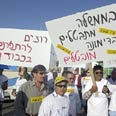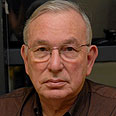In a last gasp of life before disbanding, the government announced a Negev development plan that calls for NIS 17 million (USD 3.7 million) in funding.
The plan is reminiscent of other grandiose development plans during Israel's first 20 years of statehood. Then, the new immigrants who flooded Israel established settlements, built thousands of apartment blocks, dried the Hula swamp and built the nuclear reactor in Dimona.
Some were successful, others failed. Development towns in the south are a failure, but not for lack of investment. Rather, they failed because of too much investment.
Why were they established? According to the planners, the idea was to assert the (then) young country's sovereignty over unpopulated areas of the Land of Israel, to distribute the population, to maximize the use of natural resources and to create supply and processing centers in the heart of agricultural regions.
Development towns: A failed experiment
Why did we fail? Military might took precedence over settling every last hilltop. People crammed themselves into big cities to enjoy benefits they would not have had on the periphery.
The Negev is not rich in natural resources, and the industry connected to it does not need a lot of manpower. The limited agriculture requires cheap labor. There are too many towns and they are too crowded.
In practice, we learned that the draw to large cities was stronger than the country's will to scatter its population. Strong elements of society ignored the development towns and left them weak, with no power to develop in order to continue their intermediate standing. One after the other attempt to draw job-rich industries to the Negev failed.
What did we demand? That Negev development be connected to a clear strategy of expansion. We connected the word "vision" to describe this strategy, bringing it up to the level of moral command, a demand to which there can be no challenge, a goal transferred from generation to generation like a torch.
David Ben-Gurion, originally from Plonsk, a leader who hated cities and at the end of his life went to be a shepherd at Sde Boker, obligated us to continue his far-reaching and entirely superfluous vision. We would do well to rid ourselves from this "vision."
Roads and trains
What would happen if the country made no special efforts to develop the Negev? We can assume that utilizing available land resources in the center of the country would push people from this region towards areas where land was cheaper. This is how Rishon Lezion became the fourth largest city in the country, this is how many factories were uprooted and moved to the outskirts of coastal cities, this s how Yavneh and Or Akiva developed and this is how industrial areas cropped up at a feverish pitch all along the Trans-Israel Highway.
If the state wants to accelerate this process, all it's got to do is to develop the train network and build good access roads to one central city in the south. One strong urban anchor will snowball.
And what would be with the desolate desert, with the residents of development towns that they or their parents were sent south by the state, and with the Bedouins?
The answer is that there is no need to cover the desert with cement and concrete, not even with grass or nice green parks.
Fine the way it is
The Negev is fine just the way it is. 140,000 Bedouin are scattered across 800,000 dunams (308 sq. miles), an area 16 times the size of Tel Aviv with three times the population.
But their culture is not appropriate for hastily-built rural communities. Requiring them to live in towns created destructive forces. They now need corrective preference, but leaving them in their current setting is the most efficient way of going about this.
This will be expensive in terms of supporting them with needed services, but cheaper that pushing them to towns that contradict their current stage of development.
There is no reason to pour more money into development towns, with the exception of into education and public transport that will enable residents to work in areas far from their homes. High-speed transit will turn Sderot and Netivot, and perhaps even Dimona and Yerucham, into suburbs, maybe even strong ones, of Beer Sheva.
We don't need more than that.
Yaron London is a columnist for Israel’s leading newspaper Yedioth Ahronoth

















